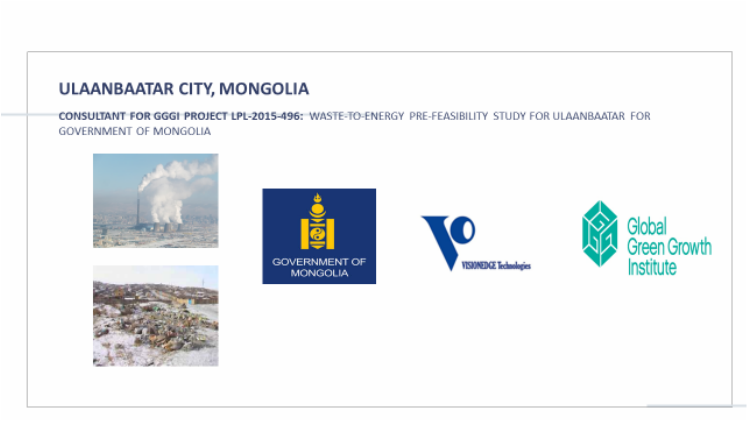Global Green Growth Institute (GGGI) Pre-feasibility Study for Waste-to-Energy Plant in Ulaanbaater for Mongolian government
The project is to actively engage in stakeholder consultations that leads to the origination of a waste to energy project and to produce a prefeasibility study of a selected waste to energy project in Mongolia. It is to provide advice on policy options to make the potential project more attractive to global and local financiers both in the public and the private sector.
Scope of Work:
The project is to actively engage in stakeholder consultations that leads to the origination of a waste to energy project and to produce a prefeasibility study of a selected waste to energy project in Mongolia. It is to provide advice on policy options to make the potential project more attractive to global and local financiers both in the public and the private sector.
Scope of Work:
- Assess current status of waste management & treatment in Mongolia (Ulaanbaatar City) and potential of waste to energy
- Review national/municipal investment plans on the relevant sectors (e.g. waste treatment, energy/renewable energy), with focus on the potential for waste to energy technology
- Assess sectoral laws, policy, regulations, barriers; assess legal/policy/regulatory framework for renewable energy investment in Mongolia (including the Public-Private Partnership framework)
- Review international experiences on the development of waste to energy projects (with private investment / PPP scheme); lessons learned and implications to Mongolia
- Conduct technology feasibility assessment (ex. site assessment, waste composition; reception, and treatment, feasible technology options (ex. Incineration, gasification, etc.), construction & operation plans, waste collection and transport plan)
- Conduct cost estimation (for design, construction & operation)
- Analyze economic benefits/drawbacks and conduct cost-benefit analysis
- Conduct financial analysis and assess Value for Money (VfM) of a PPP option compared to conventional public procurement options
- Develop suitable financing models including PPP; identify potential investors (ex. international financiers, local banks, MDBs, donor finance, climate/infrastructure financing facilities, etc.) including potential for carbon finance (CDM, NAMA, etc.); analyze obstacles for private investment/PPP
- Identify value chain (from supply of waste to consumption of energy); roles of governments, public institutes, private companies including local SMEs
- Identify policy, regulatory, and operational issues, bottlenecks, and risks in implementing the selected waste-to-energy project under the PPP model; provide policy recommendations to address these challenges.
- Provide action plans for the next step activities/recommendations including: how to prepare for tendering process; define bid evaluation criteria; identify required tendering documents including Request for Quotations (RFQ).

